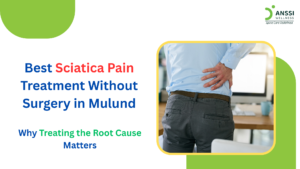Back pain is one of the most common health complaints in today’s fast-paced world. Whether you are a working professional sitting for hours at a desk, a homemaker managing daily chores, or someone leading a physically active lifestyle, back pain can affect anyone. In fact, it has become one of the leading reasons for doctor visits and reduced productivity worldwide.
While medications and surgeries are often suggested, the good news is that many causes of back pain can be addressed naturally with the right awareness, preventive habits, and non-surgical treatments.
Common Causes of Back Pain
1. Poor Posture
One of the most overlooked reasons for back pain is poor posture. Sitting hunched over a laptop, slouching in a chair, or using a non-ergonomic desk setup puts continuous strain on the spine. Over time, this leads to muscle imbalance, stiffness, and spinal misalignment.
2. Injuries
Sudden movements, falls, or accidents can cause back injuries. Even sports activities performed without proper warm-up or technique may result in sprains, strains, or disc-related issues.
3. Lack of Physical Activity
Sedentary lifestyles are another major culprit. When core and back muscles are weak due to a lack of activity, they fail to provide proper support to the spine. This results in stiffness, reduced mobility, and eventually pain.
4. Obesity and Excess Weight
Excess weight, especially around the abdomen, adds extra pressure on the spine and lower back. Over time, this additional strain can lead to chronic pain, disc problems, and mobility challenges.
5. Stress and Tension
Many people don’t realise that stress directly affects the body. Emotional stress leads to muscle tightness, especially in the back and shoulders. Prolonged tension can cause or worsen back pain.
6. Improper Lifting Techniques
Lifting heavy objects incorrectly, such as bending from the waist instead of the knees, puts undue stress on the spine. This is one of the most common causes of workplace-related back injuries.
Natural Prevention Methods
The good news is that back pain is avoidable. By adopting simple preventive measures, you can protect your spine and improve your overall well-being.
- Ergonomic Workplace Adjustments: Invest in an ergonomic chair and desk setup. Keep your screen at eye level, sit with your feet flat on the ground, and maintain the natural curve of your spine. Small adjustments can make a big difference.
- Regular Exercise and Stretching: Strengthening the core muscles is key to spinal health. Exercises like yoga, pilates, and low-impact strength training improve posture, flexibility, and stability. Stretching routines help release stiffness from prolonged sitting.
- Maintain a Healthy Weight: Keeping your weight under control reduces unnecessary stress on the spine. A balanced diet rich in anti-inflammatory foods such as fruits, vegetables, and omega-3 fatty acids can also support joint and spine health.
- Stress Management: Managing stress is as important for your back as it is for your mind. Breathing exercises, meditation, or even short mindful breaks during the day can reduce muscle tension and prevent stress-related pain.
- Sleep Posture and Support: A supportive mattress and pillow will help in maintaining spinal alignment during sleep. Sleeping on your back or side with proper cushioning reduces pressure on the spine and prevents stiffness.
Non-Surgical Treatment Options
When chronic back pain interferes with daily life, non-surgical treatments can be highly effective in managing the condition.
Non-Surgical Spinal Decompression Treatment
Non-surgical spinal decompression treatment is an advanced procedure that gently stretches the spine, reduces pressure on discs and nerves, and promotes natural healing. It is especially effective for conditions like slipped disc, disc bulge, and degenerative disc disease.
Physiotherapy and Guided Exercises
A physiotherapist can design specific exercise programs to strengthen weak muscles, improve flexibility, and restore mobility. Consistency in such exercises often leads to lasting relief.
Heat and Cold Therapy
Applying heat can relax tight muscles and improve blood circulation, while cold packs help reduce inflammation and numb pain. Alternating between the two is often beneficial for acute pain episodes.
Lifestyle Modifications
Small changes, like taking frequent breaks from sitting, using correct lifting techniques, or practising daily stretching, can prevent recurrence of back pain and keep the spine strong.
About ANSSI:
ANSSI Wellness focuses on improving the quality of life for patients suffering from spinal issues, aiming to provide relief where other conventional treatments have failed. Through advanced Non-Surgical Spinal Decompression Treatment, ANSSI is committed to helping patients avoid surgery and recover in a safe, effective, and compassionate environment.
Connect with ANSSI Wellness on LinkedIn, Instagram, and Facebook for expert guidance.




